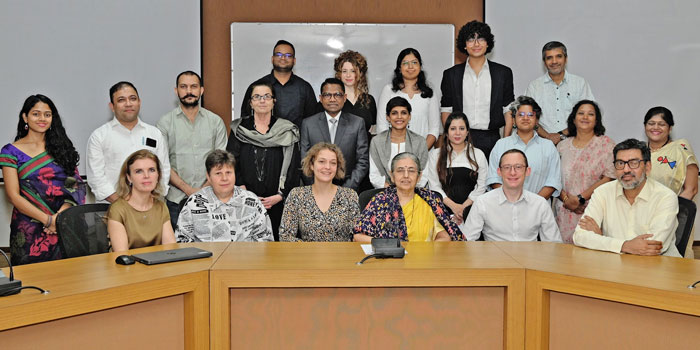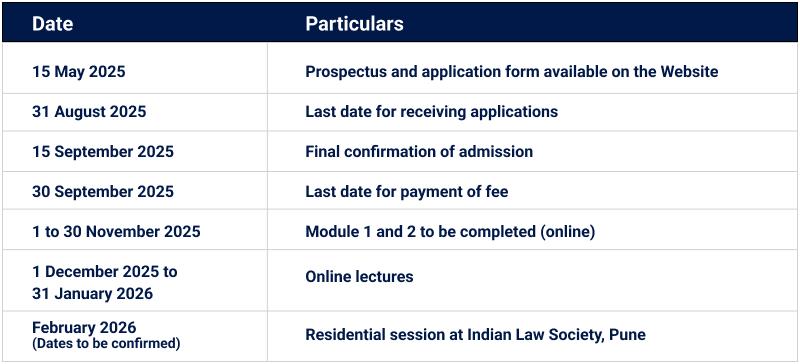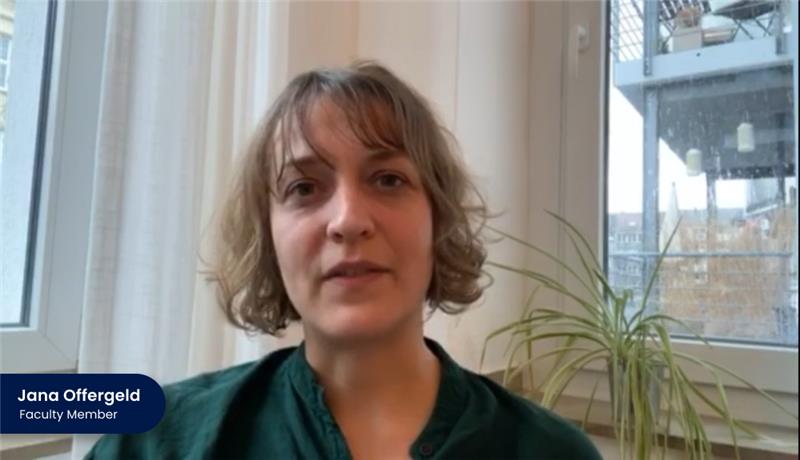Postgraduate Diploma in International Mental Health, Law, Policy & Rights-based Services
An internationally recognised program on mental health, human rights, and law, running for over a decade and equipping learners to influence rights-based policy and practice worldwide

The Postgraduate Diploma in International Mental Health, Law, Policy & Rights-based Services (formerly known as the International Diploma in Mental Health, Human Rights & Law) was launched in October 2008 and is conducted by the Centre for Mental Health Law & Policy at the Indian Law Society, Pune.
Why this programme
An internationally recognised one year program on mental health, human rights, and law, running for over a decade and equipping learners to influence rights-based policy and practice worldwide.
This one-year Postgraduate Diploma is grounded in the principles of the UN Convention on the Rights of Persons with Disabilities (UNCRPD) and explores its application to mental health legislation, policy, services, and practice. Centered on values of social justice, inclusion, and systemic transformation, the programme is designed to equip participants to drive meaningful social change for people with psychosocial disabilities. Through this course, students will gain the skills to advocate for rights-based mental health reforms, demonstrate leadership in policy and service environments, and design and manage inclusive, community-based mental health services that uphold dignity and equity.
The Diploma aims to impart appropriate knowledge and information on the role of the legislation in promoting and protecting the rights of persons with psychosocial disabilities, as well as how mental health policy and services can work to improve human rights standards within the sector.
Upon completion of the Diploma programme, students will be equipped with the knowledge and skills to actively support their countries in drafting, amending, and implementing mental health laws and policies, in line with the UNCRPD and other international standards.
Programme structure
The International Diploma has completed 16 batches so far with 162 students graduated from 64 countries.
Applications for our 16th batch (2025 – 2026) are now open! Last date to apply: 31 August 2025
Eligibility and Entry Requirements
The Diploma is ideal for professionals from the fields of law, human rights, mental health policy, and service-delivery.
Entry requirements
- Minimum graduate qualification from a recognised university in any of the following subjects: law, medicine or psychiatry, nursing, psychology, social work, social science, natural science.
- We encourage individuals with psychosocial disabilities and their caregivers / families to enrol as they are critical players in reform and can be effective advocates for change. The minimum qualification for such applications is a graduate qualification in any discipline from a recognised university.
- The selection of students is based on their experience, and statement of purpose.
- Priority is given to students who are likely to have an impact on the field of human rights for people with psychosocial disabilities and law / policy in their respective countries.
Learning Outcomes
The Diploma programme addresses human rights, mental health law, policy, services, social determinants of mental health and its interplay with human rights.
Over the duration of one year, participants will
Develop an understanding of:
- The international human rights framework as it relates to people with psychosocial disabilities, including the UNCRPD.
- The issues around the right to exercise legal capacity, the right to liberty and security of a person, and the right to informed consent.
- Mental health policy, service organisations and their relationship with the mental health legislation.
- How the mental health legislation can promote the right to health, the right to live independently and be included in the community and improve access to affordable and quality mental health care.
- Specific topics like children’s mental health, humanitarian crisis, homelessness, gender, criminal law from the perspective of human rights.
Develop the ability to:
- Draft, adopt, and enact mental health legislation, policy, and services.
- Monitor the implementation of mental health legislation, policy, and services.
- Advocate for protecting and promoting human rights for people with psychosocial disabilities.
Duration and Course Structure
The Postgraduate Diploma in International Mental Health, Law, Policy & Rights-based Services is a one-year programme that entails one on-site residential session, self-study and a final project submission.
Upon confirmation of admission, in November 2025, students are expected to go through Modules 1 and 2 of the course content. These cover the basics of mental health and law.
Online lectures: From December 2025 to January 2026, students will participate in online synchronous sessions covering key themes such as access to care, the burden of mental health conditions, and the organization of mental health policies and services. Course materials will be shared via Moodle, our open-source learning platform. Students will receive access through email and are expected to review the coursework and complete quizzes and assignments based on the content. From March to September 2026, a series of online sessions will be conducted on special topics such as child and adolescent mental health, substance use disorders, and mental health in humanitarian emergencies. An advocacy workshop will be held in November 2026, providing students with the opportunity to translate their learning into actionable strategies to advance the rights of persons with mental health conditions.
Residential Session: The residential session will begin in the first half of February 2026 (exact dates will be shared upon admission confirmation). During this period, students will participate in on-campus lectures and workshops at the Centre for Mental Health Policy, Indian Law Society, Pune. Topics covered will include the UNCRPD, criminal justice and mental health, and other key themes relevant to rights-based mental health services.
Self-study: Following the residential session, students will engage in a self-study phase, during which they are expected to complete approximately one module per month, along with its associated assignments. Participants will have continued access to the open-source Moodle platform, where all course materials and online assignments are hosted. Students are encouraged to dedicate 6–8 hours per month to self-study. They can seek academic support from faculty members, who will be available to provide guidance, clarify doubts related to their modules, and assess assignments.
Project Proposal / Critical Essay: Students are required to complete one project proposal or critical essay based on a topic related to mental health, law and human rights, policy and rights-based services. After the residential session, students will work on the proposal / essay. They are expected to invest two to three working days per month for seven months (March-September) to successfully complete the proposal / essay. Each student will be assigned an Advisor to help with the selection of a topic and writing the proposal / essay.
Modules and Main Topics
| MODULES | MAIN TOPICS |
|---|---|
| A basic understanding of mental health conditions and mental health care | An introduction to the concepts of mental disorder and their treatments. |
| An introduction to basic legal concepts and systems | An introduction to legal concepts and systems for students from non-legal backgrounds
The core areas of law, the nature of law and their critique The historical and social context of law in operation |
| Context building: mental health and human rights | The international human rights framework as it relates to people with psychosocial disabilities, including the UNCRPD.
The role of this framework in creating legal obligations on governments to promote and protect the rights of people with psychosocial disabilities. |
| Policy and legislative framework for mental health | Mental health policy, service organisation, and their relationship to mental health legislation. |
| Access to mental health care | The role of mental health legislation in promoting the right to health, the right to live independently and be included in the community, and improve access to quality mental health care. |
| Capacity, competence & Supported Decision-Making, and institution-based care | The issues around the right to exercise legal capacity, the right to liberty and security of person, the right to informed consent.
These concepts in relation to service-delivery in mental health facilities, and guardianship laws. |
| Regulatory and review mechanisms | The purpose, role, and responsibilities of regulatory and review mechanisms in the implementation of mental health legislation, policy, and service. |
| Criminal justice and mental health conditions | The role of criminal law in promoting the rights and welfare of persons with psychosocial disabilities. |
| From exclusion to inclusion: rights in the community | The role of civil and other legislation in promoting the rights of persons with psychosocial disabilities. |
| Drafting, adopting, and implementing mental health legislation | The key issues in drafting and enacting legislation, and the steps involved in ensuring the effective implementation of legislation. |
| Special topics – rights of children with mental health conditions | The multidimensional effect of social determinants on the mental health of children.
Policies and programmes purported to decrease the risks of disorders and enhance protective factors. An introduction to the UN Convention on the Human Rights of Children. Strategies to raise the neglected field of mental health of children in service development and professional training with reference to primary prevention action. |
| Special topic – rights of ‘persons with psychosocial disability’ during humanitarian emergencies | The specific needs of people with psychosocial disabilities during humanitarian emergencies.
International instruments to protect and promote their rights during crises. |
Application Process
The online application form needs to be filled and submitted along with the following:
- A written statement of purpose (250 words)
- A letter from sponsoring organisation (if applicable)
Once your application is reviewed, you may further be notified to send:
- A scanned and certified copy of your graduate/post graduate degree
- A letter of recommendation
Fee and Funding
Tuition for Indian students: INR 1,25,000 + 18% GST
Tuition fee for students from LMICs: USD 1500 + 18% GST
Tuition fee for students from MICs: USD 3000 + 18% GST
Tuition fee for students from HICs: USD 5000 + 18% GST
Tuition fee includes access to online sessions, online learning platform, course material, and proposal / essay supervision. The fee also includes accommodation costs during the residential session in Pune.
Please note: We strongly encourage participants from low- and middle-income countries to apply for the Diploma programme.
Teaching Methods and Assesment
Teaching Methods
The Postgraduate Diploma employs a diverse range of teaching methods to ensure an engaging and impactful learning experience. During the residential sessions, students will participate in in-person lectures, workshops, small group discussions, and learning through documentaries and presentations.
The interactive online sessions will be conducted via Zoom, scheduled for Friday or Saturday evenings (IST) to accommodate participants across various time zones. Each online session will last approximately 2.5 to 3 hours, encouraging real-time engagement with faculty and peers.
During the self-study period, participants will have access to the open-source learning platform, Moodle. This space allows students to easily access all course modules and complete the online assignments. They may also reach out to the course faculty for queries regarding the course content or proposal / essay discussion.
Assessment
Weightage
- Assignments – 60% (cumulative) Out of a total of 8 assignments (1 per module), students must complete at least 6 assignments to qualify for the Diploma
- Project proposal / critical essay – 40%
Diploma with a Passing Grade: Students who obtain more than 50% marks but less than 75% of total marks will be awarded the Diploma in a passing grade.
Diploma with a Distinction Grade: Students obtaining 75% or more of total marks will be awarded the Diploma in a Distinction grade.
Timeline

FAQs
How long does it take to complete the Diploma?
The Postgraduate Diploma in International Mental Health, Law, Policy Rights-based Services is a one-year programme offered by the Centre for Mental Health Law & Policy, Indian Law Society, Pune.
I am not a lawyer: can I apply?
Yes, you may apply.
The Diploma is ideal for professionals from the fields of law, human rights, mental health policy, and service-delivery.
Entry requirements
- Minimum graduate qualification from a recognised university in any of the following subjects: law, medicine or psychiatry, nursing, psychology, social work, social science, natural science.
- We encourage individuals with lived experiences and their caregivers / families to enrol as they are critical players in reform, and can be effective advocates for change. The minimum qualification for such applications is a graduate qualification in any discipline from a recognised university.
- The selection of students is based on their experience, and statement of purpose.
- Priority is given to students who are likely to have an impact on the field of human rights for people with psychosocial disabilities and law / policy in their respective countries.
How will the Diploma help my career?
The Diploma is designed to equip students with the knowledge and skills necessary to engage in rights-based advocacy and actively support countries in drafting or amending mental health laws aligned with the UNCRPD and other international standards. It fosters both professional and academic growth. Many students have gone on to pursue doctoral studies and expanded their expertise across various thematic areas covered in the programme. The Diploma also strengthens capacities in policy development and service reform from a human rights perspective, enabling graduates to contribute meaningfully to social justice and systemic change in the field of mental health. To see how past students have applied these learnings in their work, visit our Testimonials page
Where do the costs go?
The Diploma Programme is run by the Indian Law Society on a no-profit basis. It is self-funded, which means we do not get any grants / subsidies from any national or international funding bodies. Our faculty are drawn from diverse fields from different parts of the world. Their travel, accommodation, subsistence and fee are met from the programme fee. In addition, there are costs for providing teaching material to students and for the use of facilities, infrastructure and administration of the programme.
Who awards the Diploma?
The Diploma is awarded by the Indian Law Society, which is an autonomous institution established in 1923 for furthering legal education. The Indian Law Society is not-for-profit charity registered under the Societies Registration Act, 1860, and the Bombay Public Trusts Act, 1950 in the Indian jurisdiction.
